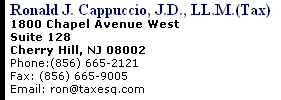|
Intellectual
Property Issues
Take Precautions
to
Ensure
Proper
Ownership |
One of
the most costly— yet easily prevented — disasters for any
business is the failure to secure ownership of intellectual
property (IP).
Here are the
details company owners and executives
should know:
Under the law, the ownership of copyrights and inventions
may actually belong to your independent contractors and
employees, unless there is a prior written agreement to the
contrary. Federal copyright law, and the laws of most states,
mandate that employees and independent contractors who invent
products, write materials and develop software may be the
owners of the IP rights.
|
Unless you
take the proper legal steps, you could find that your
company doesn't own its most prized possessions.
|
In some states an employer may only have a limited license
in an invention that an employee creates while on the
employer's time clock!
Fortunately, you can easily
prevent this type of catastrophe. All U.S. states permit
employers to require their employees to sign copyright, IP and
invention assignment agreements that give all IP rights to the
company.
A well-drafted agreement can be less than a single page in
length and should be written by an attorney. It requires the
employee or contractor to turn over or legally "assign" all
rights to the company. In addition, these agreements require
the employee or independent contractor to assist the company's
counsel in securing and enforcing the rights.
 Another good practice: Another good practice:
Ask employees
to designate, upfront, all pre-existing inventions that are to
be excluded, but to cover all new inventions that are in any
way related to your business, even if developed during the
employees' non-working hours.
For example, let's say your company makes billing software.
This agreement prevents one of your software developers from
claiming that he came up with a time management program at
night that could be of use to your company — or your
competitors.
By following these simple procedures, business owners can
avoid tremendous aggravation and loss of property that is
truly irreplaceable.
Copyright -
The copyright symbol is everywhere, but do
you know what it means legally and how it affects your
company's Web site? It's imperative that you have a good
understanding of copyrights and how to protect the content on
your site. Click "Full Article" for some of the critical
facts.

| | 
































